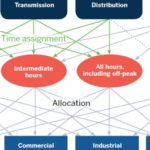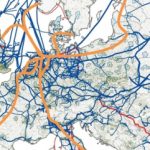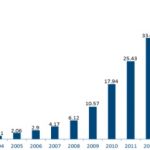Right now, energy system costs are driven by generation capacity, infrastructure upgrades, network reinforcements, curtailment and constraint payments, and imbalance costs. What’s missing is the investment in a raft of demand side management assets that are ready to go but are not part of the market, therefore not rewarded, and therefore not being invested in. Laura Sandys at Energy Systems Catapult, writing for WEF, explains why flexibility must … [Read more...]
Using ENTSO-E’s modelling for China’s grid expansion
The EU and China have similar challenges when expanding their complex grid network. Both have large populations and multiple borders (China has 23 provinces, five autonomous regions, four municipalities and two administrative regions). Both must rapidly add clean power whilst ensuring energy security at the lowest cost. Helen Farrell at ECECP describes their project to use European ENTSO-E modelling tools to assess scenarios for China. One key … [Read more...]
Electricity Market Reform: ACER must empower consumers, not just network operators
ACER, the EU Agency for the Cooperation of Energy Regulators, has delivered to the EC its preliminary assessment of Europe's high energy prices and the current wholesale electricity market design. Simon Skillings and Lisa Fischer at E3G interpret ACER’s assessment as showing it wants to maintain the status quo. However, long-term changes in market design are inevitable. The authors want ACER to accept this reality and ensure the changes are … [Read more...]
The new era of electricity needs modern ways to charge customers
Today’s technologies – wind, solar, storage - have widely differing cost and operating characteristics to fossil fuels. So the way customers are made to cover those costs – assigning different rates to different customer classes – should change. Jim Lazar and Mark LeBel at RAP explain why and how, referencing their comprehensive manual “Electric Cost Allocation for a New Era”. They describe how the full range of technologies now establishing … [Read more...]
50% Hydrogen for Europe: a manifesto
Electricity has well known limitations, mainly for bulk and long-range transport, industrial processes requiring high temperature heat, and the chemicals industry. To entirely replace fossil fuels we need hydrogen, say Frank Wouters and Prof. Dr. Ad van Wijk. It has an energy density comparable to hydrocarbons. There's more: Europe’s electric grid can’t cope with 100% electrification, yet hydrogen would use the existing gas pipe networks. The … [Read more...]
We need to trace the real fossil fuel users, not just the “end consumers”
Climate-consciousness is rising among ordinary citizens. But most fossil fuels are consumed by large technological systems (electricity networks, urban transport systems, built environments, industrial and agricultural systems), not by individuals. Simon Pirani says we need to trace that consumption to its true source, and thereby put the pressure directly on them to transition. It’s not simple: even the IEA admits it loses track of who is … [Read more...]
The rapid growth of solar integration into grids: learn from Germany
With the rapid electrification of Europe’s energy system, the network operators are facing a challenge. The integration of more and varied electricity generation is putting a strain on the growth of grids. Erik Rakhou and Chris Collins contrast the struggles the Netherlands is experiencing with the smoother ride navigated by Germany where in the 12 years to 2015 solar PV capacity rose around 100-fold from 0.44 GW to 39.7 GW. Greater investment, … [Read more...]








